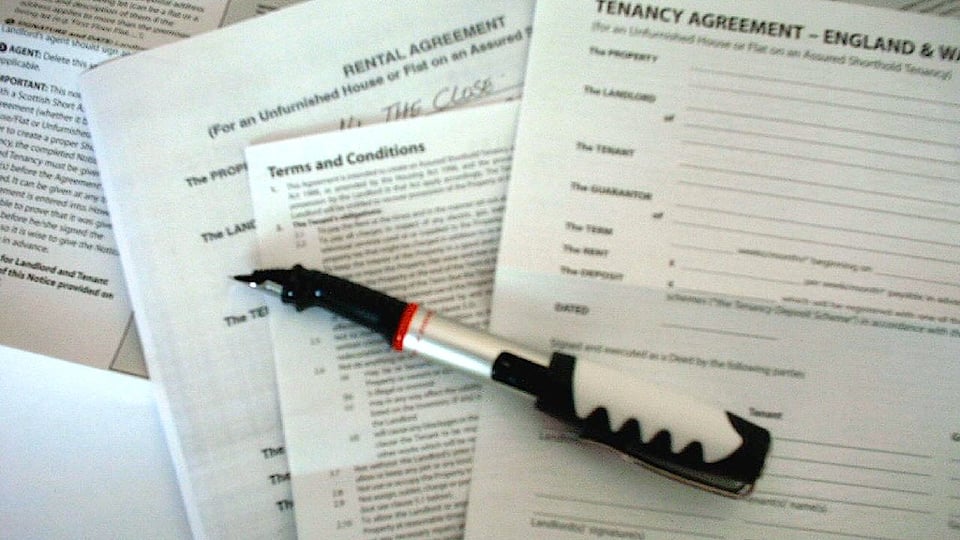There have been more than 227,000 ‘no-fault’ evictions of tenants in England over the last three years – which is one every seven minutes, a charity is claiming.
However, the claim has been slammed as ‘scaremongering’ by one landlords’ association.
After carrying out a survey, the homelessness charity Shelter is demanding that the government introduces its Renters Reform Bill which will see section 21 no-fault eviction notices being abolished.
These ‘no-fault’ evictions are for when a landlord does not have to give a reason to their tenant for ending the tenancy.
The government has said that it will be looking to ban the practice “as soon as possible”.
Evicting tenants is ‘appalling’
The chief executive of Shelter, Polly Neate, says the situation of evicting tenants is “appalling”.
She said: “Millions of renters live in limbo, never able to settle, in case their landlord will kick them out on a whim.
“It’s appalling that a private renter is slapped with a no-fault eviction notice every seven minutes, despite a government promise three years ago to scrap grossly unfair evictions.”
Shelter says that the Queen’s Speech next month should contain a government promise to deliver the long-promised Renters Reform Bill which will include the banning of no-fault evictions.
This will also, she added, “Give tenants some stability during times of uncertainty”.
Ms Neate said that with bills and inflation rising, tenants are needing to secure a home desperately and many will struggle to pay their moving costs if they have to move unexpectedly.
Plans to end unfair evictions
The government says that revealed its plans in April 2019 to end unfair evictions and outlined its plans to abolish them.
And during the Covid-19 pandemic, the government imposed an evictions ban that ran for 14 months and ended in May last year.
A government spokesman said that the reforms will be set out in its Private Rented Sector White Paper, and this will be published as soon as possible.
The spokesperson added that the government is providing £22 billion to help households deal with rising living costs and putting an average of £1,000 per year into working family pockets through direct support with bills and Universal Credit.
Lived in at least three rented homes
Now a survey carried out by YouGov, reveals that around 2.8 million people, or a quarter of private tenants, have lived in at least three rented homes over the past five years.
One in five of the households who rent a home are families with children - and Shelter says that it is concerned about the destabilising impact of constantly having to move home is having on children.
In Scotland, new rules were unveiled in 2017 that require landlords to give a reason when they end a tenancy.
And in 2021, a new law was passed in Wales that the amount of notice that landlords must give a tenant was increased from two months to six months.
There’s also legislation going through the Northern Ireland assembly for extending the notice period tenancies.
System that is workable and fair for landlords
The National Residential Landlords’ Association says that section 21 eviction notices must be replaced by a system that is both workable and fair for landlords and tenants.
The NRLA’s chief executive, Ben Beadle, said: “Shelter needs to stop scaremongering. The majority of landlords do not spend time plotting to get rid of tenants for no reason.”
He pointed to government figures that show 10% of tenants who move home will do so when asked by their letting agent or landlord.
And the number of section 21 cases coming to court has been dropping since 2015.
‘Government is committed to abolishing section 21’
Mr Beadle said: “The government is committed to abolishing section 21, but it has got to be replaced with a system that is both workable and fair for landlords and tenants.
“Getting rid of section 21 would, on its own, make it all but impossible to take action against anti-social tenants who blight the lives of fellow tenants and neighbours.”
The NRLA, which represents around 95,000 landlords, says it is looking to publish plans for a new system and is urging Shelter to work with them.
The managing director of Accommodation for Students, Simon Thompson, said: “Landlords have been patient and supportive during the Covid-19 lockdown when evictions were banned and there will be landlords keen to get their property back from tenants not paying rent or who are anti-social.
“Most landlords provide a safe and comfortable home for their tenants; most tenants are happy with the property they rent but there needs to be a system in place for dealing with those who are anti-social or not paying rent. Without it, it’s likely lots of landlords will simply sell up and leave the sector.”
High demand forcing tenants to pay above the going rate
Meanwhile, it has been revealed that high demand is forcing 15% of tenants to pay above the going rate in a bid to secure a rental property.
According to The Deposit Protection Service, average rents in the UK have risen for the sixth consecutive quarter.
And, they say, there’s evidence that some tenants are now paying above the going rate so they can secure a home.
The average rent in the UK is now £849 a month, that’s a 1.8% rise on the last quarter of 2021.
It’s also a 6.1% rise in the first quarter of last year.
The organisation’s managing director, Matt Trevett, said that consistent rent rises every quarter, and a survey that found that tenants are overpaying to secure a home, underlines the intense demand for rental homes in the UK.
He also pointed to the ‘tight supply of homes to rent’ which is also pushing up rent prices.



